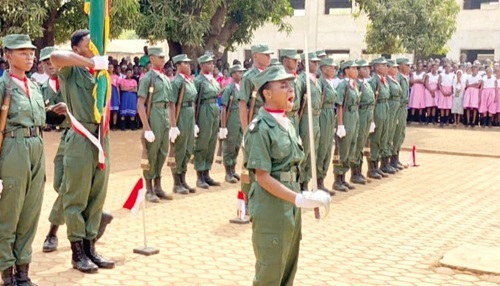Lifestyle News: Fashion, Health, Relationships & More | The Mirror - Graphic Online

Stakeholders call for mandatory school cadet training to curb indiscipline
Communication Consultant, Dr Mawugbe Mensa, who made the call in Accra, believes that mandatory enrollment of all first-year students in the School Cadet Corps will instill discipline and curb the rising trend of indiscipline and school violence.
According to him, cadet participation must be made compulsory for all students upon admission, after which it can be made optional from the second year.
"The Cadet Corps, with its focus on leadership, teamwork, and self-control, has proven to be an effective tool for character development in young people. Making cadet participation compulsory for first-year students will instill these values early and create a more structured and disciplined school environment," he stated.
Dr Mensa stressed that the cadet training model, which promotes discipline, responsibility, and leadership skills, provides a structured pathway to reform student behaviour and cultivate a culture of respect and orderliness in schools.
Currently, joining a school cadet in secondary school is optional. Many years ago, first-year students had a three-month mandatory cadet training.
The stakeholder meeting, organised by the Misornu Safety Center, a public service NGO dedicated to creating security and safety awareness education and training for individuals, organisations, and communities, was attended by the leadership of the National Cadet Corps Ghana, security, safety, emotional intelligence, and conflict resolution experts to discuss how to promote safety and security in schools.
The call comes in the wake of growing incidents of student misconduct, including violence, vandalism, and general disregard for authority, necessitating more decisive interventions to instill discipline in the students.
The Chief Executive of Misornu Safety Center, DCOP (Retd) David Eklu and Cadet Major Osei Bonsu, Health and Safety Staff Officer of the National Cadet Corps, endorsed the call for the mandatory cadet training, stressing its advantages in promoting discipline in schools, as well as fostering patriotism, responsibility, and resilience in young people.
According to Cadet Major Osei Bonsu, the National Cadet Corps is currently the largest youth body in Ghana, with a membership of 76,577 students across basic, secondary, and tertiary institutions. Over the years, it has played a critical role in shaping the character of students, providing them with leadership training, security awareness, and crisis management skills.
He noted that although the cadet corps remains committed to expanding its coverage, it continues to grapple with a lack of funding and inadequate cooperation from some stakeholders, including school heads and teachers.
Therefore, he called for the support of all stakeholders to ensure the success of the cadet's operations in the interest of students and schools.
DCOP (Retd) Eklu, who led the introduction of the Police school cadet corps in 2005, commended the National Cadet Corps for its successes and bemoaned the lack of resources for school cadets.
Through the partnership support from stakeholder organisations, he highlighted the high potential of school cadets to instill discipline and implement preventive strategies to reduce criminal activities in schools.
He also referenced a recent call to action from the Ghana National Association of Teachers (GNAT) for swift intervention to address these issues, expressing the Misornu Safety Center's readiness to collaborate with the Ghana Education Service and relevant security agencies.
DCOP (Retd) Eklu called on school administrators, teachers, and parents to support school security and safety initiatives, emphasising that a disciplined student population translates into a safer and more productive learning environment.

